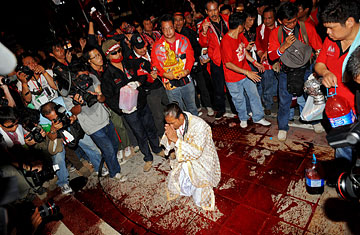
A Hindu priest performs a ritual after supporters of deposed Thai premier Thaksin Shinawatra spilled blood at Prime Minister Abhisit Vejjajiva's Democrat party offices in Bangkok on March 16, 2010
The images were shocking — and strange. On Tuesday, thousands of Thai protesters splattered buckets of their own blood outside the Prime Minister's office in Bangkok as a Brahmin priest in flowing white robes lit incense, chanted spells and cast a curse upon the government.
As theater, it was both effective and mysterious: clips of the blood curse led international news broadcasts, with viewers and analysts bewildered as to what the protesters were trying to achieve. But in Thailand, it was anything but an aberration. Curses, dark rituals and black magic have long been part of the political culture of the country and some of its neighbors. And to some Thai analysts, the strange rite was a rare public revelation of a more covert aspect of the ongoing conflict between the country's political movements — a war of the supernatural.
The protesters, known as the Red Shirts for the color they wear, were supporters of fugitive former Prime Minister Thaksin Shinawatra, who was ousted in a 2006 coup and has fled the country rather than serve a prison term on a corruption conviction. His opponents include the current Democrat-led government of Prime Minister Abhisit Vejjajiva, the military, a rival group of protesters known as the Yellow Shirts and, according to some, Thailand's monarchy. Thaksin's followers are comprised largely of the rural poor, and so it was easy to dismiss, as many commentators did, the bloody curse as a desperate act by uneducated farmers. But in Thailand, despite modern commuter Skytrains, gleaming new international airports, and a populace with a passion for the latest IT gadgets, members of all classes regularly pay deference to the supernatural. From hit men getting tattoos they believe will repel bullets, to aristocratic ladies trading stocks on the advice of astrologers, and ministers who pay tens of thousands of dollars for amulets they believe will ward off evil, the unseen is a serious, and potentially lucrative, business.
Thailand is a nation that prides itself on its Theravada Buddhist heritage. But Buddhism in Thailand is blended with a brew of Hindu, animist, Khmer, pagan and other beliefs. King Bhumibol Adulyadej, the country's 82-year-old constitutional monarch, spent time as a Buddhist monk but also retains astrologers and Brahmin priests at court, as is tradition. So it's no wonder that coup plotters, Prime Ministers and lawmakers have frequently consulted fortune-tellers before making important decisions. Performing dark rites to increase one's power and defeat your adversaries is as pervasive among the political class as bribery and vote buying. Even Thaksin, who became a billionaire from satellite services, computers and telecommunications, once declined to answer a reporter's question because "Mercury [was] not in the right house."
In fact, according to Wassana Namnuan, a Bangkok Post reporter, Thaksin and his opponents have been deeply engaged in black magic battles for dominance of the country for several years. "Both sides have been casting curses and spells upon each other," says Wassana who has written a book on the subject in Thai called Secrets, Trickery and Camouflage: The Improbable Phenomena. According to Wassana, Thaksin believes he is the reincarnation of a Burmese king who killed many Thais, and so has engaged in elaborate cleansing rituals to wash away the sins of his past lives. While in power, Wassana says Thaksin performed several saiyasat, or black magic rituals, that he hoped would prolong his rule for life. While visiting Burma he sought counsel from a deformed astrologer nicknamed "ET" who is favored by the generals that have kept the country in their iron grip for more than half a century.
